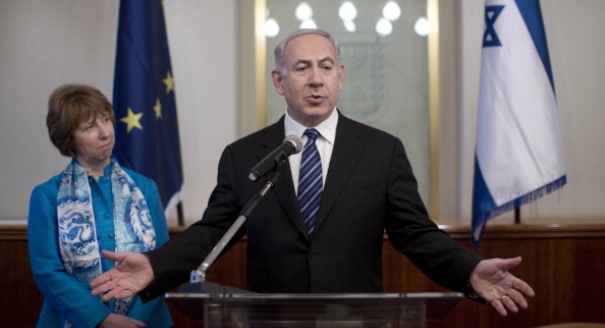The EU and Israel are locked in a dispute that confirms how emotionally and politically fraught their relationship has become, particularly during Benjamin Netanyahu’s tenure as Israeli prime minister.
Even though Israel is one of Europe’s most important trading partners, the two sides’ efforts to establish any strategic relationship have always failed. The latest spat makes that aim even harder to achieve.
The current EU-Israeli dispute is about a decision by Catherine Ashton, the EU’s foreign policy chief, to publicize guidelines for funds that the European Commission will allocate to Israel during the next budgetary phase, beginning in 2014.
The guidelines state that in future no EU funding for grants, scholarships, or prizes will be awarded to any Israeli entity operating in the occupied territories of the West Bank, East Jerusalem, the Golan Heights, or the Gaza Strip. This includes research and nonprofit groups involved in academia, culture, science, and sport.
Ashton’s new guidelines complement Europe’s tougher stance on “rules of origin,” under which goods produced in the settlements should not benefit from the tax advantages that Israeli-made goods enjoy.
Netanyahu and several of his cabinet ministers have rounded on the EU. They are accusing the EU of hindering the mediation efforts of John Kerry, the U.S. secretary of state, who last week announced that peace talks between Israel and the Palestinians would resume in Washington after a three-year standoff.
The timing of the publication of the EU’s guidelines “sabotages the efforts that U.S. Secretary of State John Kerry is putting into bringing both sides back to the negotiating table,” Israel’s finance minister, Yair Lapid, said.
Israel also claimed that the EU was setting conditions for the resumption of peace talks by stating that no funds would be available to Israeli entities outside the internationally recognized 1967 borders.
On both counts, the Israeli criticism is disingenuous.
Until an agreement is reached between Israel and Palestine, international law recognizes only the 1967 borders. As a law-abiding entity, the EU is bound by relevant UN decisions. Israeli’s occupation and the Jewish settlements are illegal.
Apart from the guidelines’ political symbolism, it is hard to see how the miniscule amount of money that the European Commission allocates for grants and prizes could jeopardize any new peace talks.
It seems that Israel’s Far Right is looking for any excuse to make the peace negotiations fail before they have even begun. It is possible too that the Israeli government believes that some EU countries will disown the guidelines rather than being identified with any failure over the peace talks. This is unlikely. Ashton had the support of all 28 EU foreign ministers.
No, issuing these guidelines is not what Europe should be criticized for. What is surprising is that it has taken the EU so long to publish the new rules. Even symbolically, the EU has gone along with Israel’s practice of establishing “facts on the ground” both in East Jerusalem and the West Bank, jeopardizing the viability of a two-state solution.
Despite their support for a two-state solution, the Europeans, and especially German Chancellor Angela Merkel, were never united enough to agree on a policy to stop the settlement expansion. Now, the Europeans are finally realizing the costs of this policy. For Merkel, who is a sympathetic supporter of Israel, the two-state solution would secure Israel’s Jewish identity.
There is one Israeli argument against the EU guidelines that deserves consideration. Rejectionist movements in Palestine, which abhor Mahmoud Abbas, the Palestinian leader, and his anachronistic Fatah party, believe that it is far better to shun any peace talks because this would isolate Israel.
These rejectionist groups, which include Hezbollah (whose militant wing was banned by EU foreign ministers on Monday), Hamas, and other groups supported by Iran, tap into the Palestinians’ deprivation and humiliation. Because of that, the rejectionists enjoy some popular support.
But do they really serve the cause of the Palestinians?
Young Palestinians want an end to their humiliation at Israeli checkpoints and border crossings, as well as access to clean water, schools, decent housing, jobs, and the right to see the world. Instead, they are saddled with a leadership that is obsessed with power, victimhood, and a dependency culture—and financed by the EU.
The Abbas leadership is torn between colluding with the Israelis, pandering to the rejectionists, and appeasing the Americans.
The EU would enjoy more credibility in putting a limited amount of pressure on Israel if it worked harder for democratization in Palestine. After all, the EU is Palestine’s biggest donor. And giving money, as Ashton is finally making clear through her guidelines, carries responsibility.






.jpg)